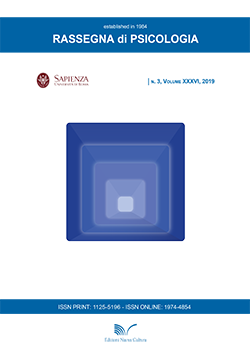The roles of stressful life events and religiosity in adolescent depression
DOI:
https://doi.org/10.13133/1974-4854/16713Keywords:
adolescents, depression, stressful life events, religion, values.Abstract
Religiosity, the extent to which an individual is committed to the religion he/she professes, may be a protective factor against depression. Although in the Italian socio-cultural context religion is a predominant feature of society, the role of religiosity as a psychological buffer against depression in adolescence is understudied. The present study explored (a) the association between recent stressful life events and depressive tendencies and (b) whether higher religiosity could be a predictor of lower depressive symptomatology controlling for the effects of stressful events in a sample of Italian adolescents. Two hundred seventy-five adolescents completed the Children’s Depression Inventory and two questionnaires measuring religiosity and perceived stressful events, respectively. Fifteen percent of the sample reported depressive tendencies above clinical thresholds. Having experienced school problems and parents’ separation was associated with higher depressive symptomatology. When religiosity was added in the logistic model, the effects of the stressors became non-significant, and a significant effect of religiosity emerged (β= -0.55, p= 0.01). Adolescents with higher religiosity reported lower depressive tendencies, irrespective of the stressors’ type. Religiosity might be a psychosocial buffer against depression in adolescence.Downloads
Published
2019-12-31
Issue
Section
Articles
License
Copyright (c) 2019 Andrea Pozza, Barbara Barcaccia, Davide Dèttore

This work is licensed under a Creative Commons Attribution 4.0 International License.

